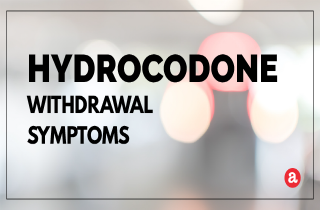Withdrawal from hydrocodone is difficult.
When you take away chemicals like hydrocodone from your body, chemicals that have altered your brain, you’re in for a pretty harsh reality. Your body and brain can react strongly, even violently, sometimes. The hydrocodone withdrawal timeline of symptoms peak anywhere from 24-72 hours after last dose, but acute symptoms usually resolve without medical intervention within a week or two after detox begins. So what can you expect as you withdraw from medications that contain hydrocodone?
When does hydrocodone withdrawal occur?
Withdrawal symptoms occur when you lower doses of hydrocodone, or stop taking hydrocodone abruptly after taking it for several weeks or more. This is because the body makes adjustments to adapt to the presence of hydrocodone over time. And getting high on hydrocodone comes with a cost. So if you take hydrocodone every day for a few weeks, your body gets used to the medicine. Hydrocodone bind to receptors in the brain and blocks the feeling of pain. And when hydrocodone is no longer present, you experience both the pain that you were trying to block, as well as other symptoms that the absence of hydrocodone provokes.
The good news is that slowly tapering off hydrocodone meds and slowly lowering doses may help relieve these symptoms. But what exact symptoms occur after you stop taking hydrocodone?
Symptoms of hydrocodone withdrawal
The intensity and character hydrocodone withdrawal symptoms are directly related the total daily dose, the interval between doses, the duration of use and the health and personality of the user. Withdrawal symptoms usually appear shortly before your next scheduled dose if you decide to stop taking hydrocodone cold turkey. Early withdrawal symptoms often include:
- runny nose
- sweating
- watery eyes
- yawning
- As hydrocodone withdrawal worsens, symptoms can include
- abnormally heightened sensitivity to pain
- chills alternating with flushing and excessive sweating
- cold flashes with goose bumps
- diarrhea
- drug craving
- increased blood pressure
- increased heart rate
- insomnia
- involuntary leg movements
- loss of appetite
- muscle and bone pain
- nausea
- restlessness
- severe depression
- tremors
- vomiting
If you go through withdrawal are you addicted to hydrocodone?
No. Just because you go through hydrocodone does not mean that you are addicted to it.
In fact, physical dependence on opioids like hydrocodone is expected if you have been prescribed hydrocodone for more than a few weeks. But physical depedences is very different than addiction. The symptoms of hydrocodone addiction include mental compulsion to use hydrocodone, in spite negative consequences of use. In other words, hydrocodone addicts continue taking hydrocodone even in the face of problems with their health, jobs, or family life. By contrast, long-term use of hydrocodone can result in two medical conditions. Although these conditions may also be present during addiction, they are markers of physical dependence.
1. Tolerance – After time, higher doses of hydrocodone are required to get the same initial effects (pain relief).
2. Withdrawal — The body adapts to the presence of hydrocodone and withdrawal symptoms occur if use is reduced abruptly.
Can I treat hydrocodone withdrawal symptoms?
Yes. There are medications and treatments that can assist you during hydrocodone withdrawal. Even if you are taking hydrocodone as prescribed, withdrawal from this opioid can be very difficult. This is why doctors suggest that all people withdrawing from hydrocodone do so under medical supervision. There are medications and treatments that can help make withdrawal more bearable.
If you think that you may have a problem with hydrocodone, don’t be afraid. There is help available. Please post your questions about hydrocodone detox and withdrawal here. Or maybe ask questions about potential hydrocodone addiction. We are here to help you find your answers or connect you with people who have been through hydrocodone withdrawal.









Related Posts